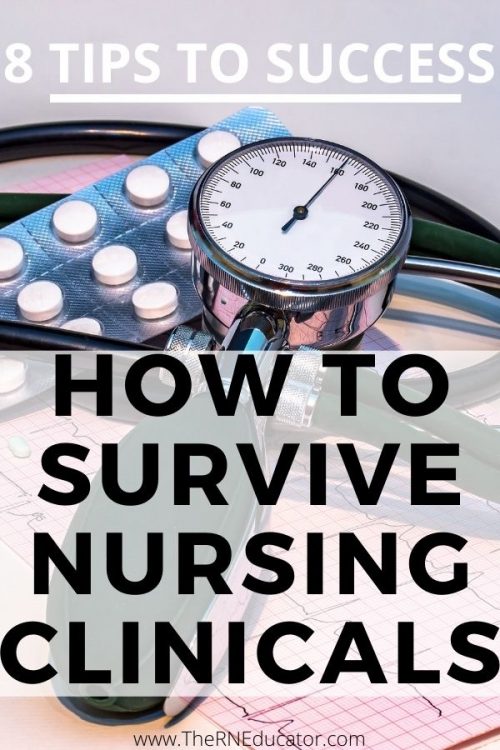How to Survive Nursing Clinicals: 8 Tips to Success

Hello friends! Today we are talking about a HUGE component of nursing school. If you are already in nursing school you know exactly what I’m talking about based on this title but those of you who are thinking about nursing school or are in the pre-nursing phase nursing school clinicals make up about 50% of nursing school. It is when you practice everything you learn in lecture (classroom) at the hospital or clinical site with actual patients.
Nursing school clinicals are one of the most important areas in practicing and growing your skills as a future novice nurse. Which is why I decided to write this blog post and share 10 must know tips in order to be successful and get the most out of your clinicals. Follow these tips and I guarantee you will come out with a wealth of knowledge and experience, as well as CONFIDENCE and let’s not forget some possible connections that can lead to future job offers (these are great opportunities to network!)
Tip #1: Be prepared and be on time
This is probably one of the most, if not THE most, important tip I can give you. Why? Because first impressions MATTER. Being on time shows that you value your preceptor and clinical instructors time and that you are ready and willing to learn and care for patients at the start of shift (just like a staff nurse would).
Being prepared means you are ready to take on whatever the day brings you and quite honestly, makes you stand out. There are times when some nurses may start off prepared and somewhere mid-shift left their pen lying around somewhere (hence why we always need pens!), misplaced their stethoscope, don’t have a scrap piece of paper, left their penlight at the nurses station, trust me! it happens. This is real life nursing and when you come in and your preceptor is ruffling around searching for a pen or a penlight and you say “here you go! I have an extra.” you are automatically an angel!! Do this enough times and trust me, you WILL get noticed. Not only will it help you survive nursing clinicals but possibly even have a special shoutout at the nurses station for it.
Tip #2: Have a pocket drug guide book handy.
Before giving any medications with your preceptors you must look up the medication you are giving, why you are giving it and its potential side effects. This is something you need to do as a nurse AND nursing student. You might see nurses not do it as frequently because they have become familiar with the medication BUT keep in mind, not all medications are given for the same reason.
Tylenol can be given for pain or fever. It is important you identify the reason you are giving a medication before administering it.
You don’t want to go into a patient’s room and say “Okay Mr. James I am giving you Tylenol for your pain.” Mr. James responds “But I don’t have any pain.” and in reality the medication was ordered for Mr. James’ fever. That might not make you look very good. Always do your research on what you are giving and why.
Side effects are also important so you can educate your patient on what to look out for while you aren’t around as well as for your own knowledge when it is time to re-assess your patient.
Tip #3: Ask questions.
This is your opportunity to learn so learn as much as you can! You are paying a lot for nursing school, friends! Use these resources to your advantage. Asking questions not only makes you look like you aren’t just going through the motions but are actually interested in what you are learning. Asking questions will also naturally place you in a position for success because you are learning new knowledge to help you understand and piece together lecture and clinicals. That is the key thing here. Anyone can learn from a book but tiring real life experiences to what you learn in class is invaluable to your future as a nurse.
Tip #4: Show initiative and step out of your comfort zone.
Showing initiative in performing tasks and learning will DEFINITELY set you up for success. Not only will it help you survive your nursing clinicals but you will also stand out in a pool of new nursing students. Showing initiate means volunteering for tasks or skills to help your preceptor. It makes you seem interested in learning and it also shows that you are a team player.
Step out of your comfort zone by attempting to practice something you may not have had many opportunities to practice. Yes, it is scary but this is your chance to learn and practice without the “real pressure” of being the assigned nurse. Keep in mind, 1. you must have already learned the skill you are going to perform and 2. what you are allowed and not allowed to do during clinicals. For example, during some rotations you aren’t allowed to start an IV. You must first get checked off in your nursing school’s lab or by a professor before you can attempt on an actual patient. Just keep these things in mind prior to doing a skill in clinical. Students have actually failed clinicals because of this.
Tip #5: Be ready for bonus opportunities.
Yup, that’s right! Be ready for bonus opportunities. Your clinical instructor sometimes makes his/her rounds and says “Who want’s to insert a foley on a patient?!” Be ready to jump right in and volunteer. Is it scary? yes! Is it worth it? Hell yes! This is your chance to learn. If your clinical instructor is asking it’s because she scavenged for an opportunity for one of you to practice a skill with HER around. This is so great because when this happens your instructor is usually the one who is teaching you all the tips and tricks you need to know and guiding you along the way. Use these opportunities to your advantage and hey! If someone else gets selected to do it then asks if it’s okay for you to observe? You can still learn a lot from observing and listening. Nothing like first hand experience though.
Tip #6: Keep a pocket notebook at hand.
You never know when you’re going to need a scrap of paper to jot down important nursing notes, nursing tips or vital signs! Trust me, you’ll need it more often than not. You can also use the first few pages to jot down things you will find useful during clinicals. You can refer these later on. Call them “cheat sheets” if you will and they can include things like normal vital signs, head to toe assessments, and SBAR.
Tip #7: Have an open-mind.
Remember, you are there to learn and soak in everything your preceptor is willing to teach you. You may come across different nurses who do things a little differently. You may agree with some and you may like other methods better. The point is, keep an open mind and learn new things from each of them. As long as it is following proper protocol and maintaining patient safety you should be good. However, always makes sure you are following your university’s standards and policies.
Tip #8: Never lose track of your ultimate goal.
Nursing school is tough. Nursing clinicals are exhausting. But never forget why you started in the first place. Whether it’s for family, your own personal accomplishments, or for the love of nursing, you went into this for a reason. Nothing in life comes easy and I assure you the days will pass and they will get easier. Nursing clinicals will get easier. The long days will get easier and you will see how much you grow as a nurse throughout the program. There is no better feeling than walking across that stage getting handed your diploma. Wait- I take that back. There is no better feeling then seeing the “PASS” next to your NCLEX exam. Never lose track of your ultimate goal.
Hope you guys enjoyed the post! Would love to hear of any other tips for success that you have or found helpful during your nursing clinicals! Comment below and share with the world.
’till next time,
The RN Educator

Share this:
Related Posts
What’s in a Pediatric Crash Cart? Nursing Students read NOW!
A pediatric crash cart is a mobile unit containing essential equipment and medications required for…
Share this:
How to Become a Confident Nurse
If you are anything like me, and let’s face it (like every nurse…



